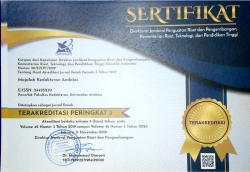EARLIER FORMAL ETHICS EDUCATION, THE IMPORTANCE OF MEICAL ETHICS AND EXPECTATION OF ETHICS DOCTOR IN FIRST GRADE MEDICAL STUDENTS OF MEDICAL FACULTY UNIVERSITAS TANJUNGPURA PONTIANAK
Abstract
Abstract
Health care decisions are based not only on clinical and technical grounds, but also on
ethical grounds. Although we carefully weigh the clinical and technical aspects, ethical issues
involved may be overlooked. A legal framework or code of conduct governing doctor's decisions
and behaviour may help overcome this problem but they often provide rigid guidelines for a
limited number of situations. Earlier education in ethics might have some advantages to build a
good medical character. The perception of the importance of medical ethics could also had an
effect to the expectation of a good medical doctor should be. This research was a cross sectional
study in first grade medical students of medical faculty Universitas Tanjungpura Pontianak,
conducted in the last week of April, 2014. All of first grade medical students participated in this
study. This subjects given questionaire contained several questions : did they ever get a lesson
of ethics in their Senior high schcol, how important the medical ethics and after studied medical
ethics, what were their expectation ?. 86 subjects participated, 3'1 (36,05%) subjects are male
and 55(63,95%) subjects are female. The Age range from 16-20 years old, median 1B years old
and mode 1B years old. The subject came from 39 senior high school, was spread from papua,
java dan kalimantan. Only 10(25,64%) senior high school had been given ethics in their
curriculum and this'1C school all located in Kalinrantan. One subject (1,16%)stated that ethics
just a common lesson while 35 (40,7A %)subjects stated ihat ethics was inrportani and most of
the subjects, 50(58,14%) subjects stated that ethics was very important lesson. The expectation
after studying medical ethics are : 39(45,35 o/o) subjects: respect and emphatize the other people,
17 (19.77%) subjeets : be a betier person, 14(16,28o/c) subjeets: hospitable docior, 11 (12,79o/o)
sub;ects :Apply the basic principle of bioethics and 5 (5,81%) sublects :treat the other like we'd
like to be treated. Twenty five point sixtyfour percent of the prirhary school of first year medical
student gave ethics lesson. Most of Subject stated that medical ethics is a very important lesson.
The expectation after studying medical ethics varies: respect and emphatize the other people, be
a better person, hospitable doctor, Apply the basic principle of bioethics and treat the other like
we'd like to be treated.
Affiliasi Penulis: l.Departement of Pharmacology, Medical Faculty Universitas Tanjungpura,2.Depa(ement of
tr4icrobiology Medical Faculty Universitas Tanjungpura, 3. Departement of Anatomy Medical Faculty Universitas
Tanjungpura, Korespcndensi :Arif Wicaksono, email :drarii,vicaksono@gmail.com.
*@
TEil
Supplen-ren Majalah Kedokteran Andalas' Vol' 37' No Supl'1' Maret 2014
ETIKoLEGAL,SEcoNDoPINIONDENGANSENGKETAMEDIS
Noorman Herryadi
Korespondensi : Noorman Herryadi' email : noormanherryadi@yahoo'com'
oortr"lu,,.an
ini mencoba mengetengahkan hubungan antara second opinion dengan sengketa
medis dari aspek Etikolegal Kedokteran, kaitannya dengan perlindungan bagi dokter dan bagi
pasien. Second Opinion Jdatan hak pasien dan kewajiban dokter untuk melaksanakannya dalam
menjalankan profesi r"oort","nnya. Dalam kenyataan banyak sengketa medis, dimana pasien
atau keluarga/ahli warisnya melakukan fenuntutan hukum kepada dokter atau Rumah Sakit
yang merawatnya, v*g olr"nabkan oten-reterangan atau opini dokter lain atau pihak lain yang
dianggap berkompeten-untuf memberi keterangan atau opini'
r{nkrar - nerlindunoar
Kata kunci: second opinion - sengketa medis - perlindungan dokter perlindungan paslen





















